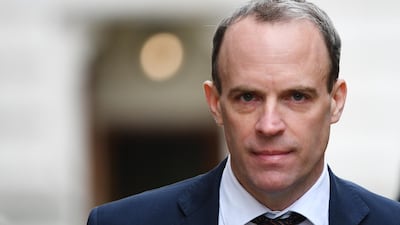Britain’s Foreign Secretary Dominic Raab has said that the international community now has an opportunity to resolve Yemen’s five-year long civil war.
Yemen's war began in 2015 when the Iran-backed Houthi rebels tried to overthrow the government of President Abdrabu Mansur Hadi, capturing the capital of Sanaa.
Recent weeks have seen significant Houthi advances in north Yemen as they launched an offensive to gain control of Al Hazam city, the capital of Al Jawf province, which borders Saudi Arabia.
They also seized large parts of Nehim district, near Sanaa.
The resumption of fighting in Al Jawf has displaced about 70,000 people to Marib, the International Committee of the Red Cross said.
“We certainly support the UN track, we want to see de-escalation," Mr Raab told Al Arabiya on Tuesday. "We want to see a political resolution of the conflict in Yemen.”
The foreign secretary had just returned from a trip to the Gulf where he discussed Yemen with the Sultan Haitham of Oman and Saudi King Salman, as well as foreign officials.
“There is now an opportunity, we think in Yemen, to resolve the conflict and to give the people of Yemen the prospects of a brighter future and that will require pressure on the Houthis, but also compromises by all parties in order to navigate our way forward," Mr Raab said.
"And of course, we’re supporting the UN special envoy and all his efforts in the region."
He said Britain’s main message to Gulf allies was that the world could not afford to see Iran acquire nuclear weapons.
A nuclear deal signed by Iran and global powers in 2015 put limits on Iran’s uranium enrichment capacity in exchange for the lifting of sanctions on Tehran.
But the accord suffered a blow when the US withdrew from it in 2018.
Tension between Iran and the West has increased this year after the killing of Tehran’s most senior military general, Qassem Suleimani, by the US on January 3.
Iran has retaliated by launching missile strikes on two US military bases in Iraq.
“We want to see Iran come back into compliance with its obligations but we will hold Iran to account when it systematically flouts the basic rules of international law or the deal that it's done,” Mr Raab said.
“And I think that it's really important that we work closely with our partners in the region but also that the Europeans and the North Americans give a very clear message on this: we cannot afford to see Iran acquiring nuclear weapons."
Mr Raab said he still believed the nuclear deal could work, but ultimately the decision would lie “with the regime in Tehran”.
“We will hold Iran to account but at all times we would like to see the door left open for Iran to do the right thing, come back to the negotiating table and build confidence that it’s actually a responsible member for the international community,” he said.

